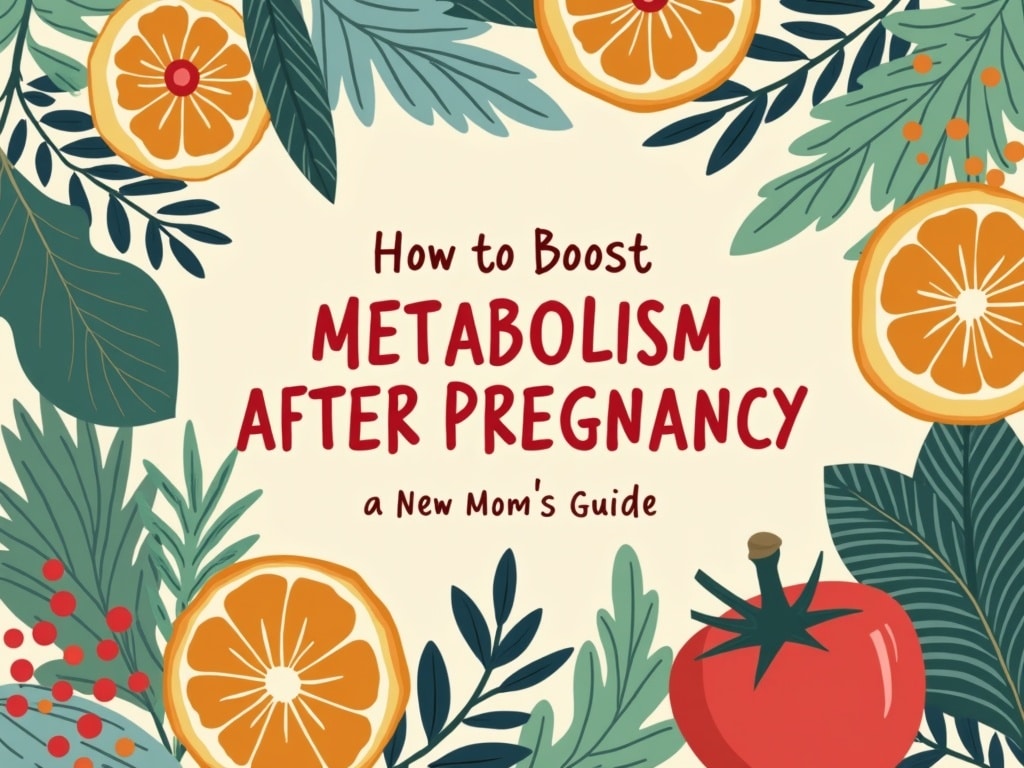How to Boost Metabolism After Pregnancy: A New Mom's Guide
Bringing a new life into the world is nothing short of miraculous. But let's be honest, the aftermath can leave you feeling like your body is a stranger. One common concern among new moms is a sluggish metabolism. It's not just about fitting back into your pre-pregnancy jeans; it's about energy levels, overall health, and feeling like yourself again. If you're wondering how to boost metabolism after pregnancy, you're not alone. This comprehensive guide will explore safe, effective strategies to reignite your metabolic fire and reclaim your vitality.
Understanding Post-Pregnancy Metabolism
Pregnancy is a metabolic rollercoaster. Your body prioritizes nourishing your baby, leading to significant hormonal shifts and increased energy demands. After delivery, your metabolism doesn't magically snap back. Hormones like estrogen and progesterone gradually return to pre-pregnancy levels, and your body adjusts to no longer supporting a growing fetus. This transition can lead to a slower metabolic rate, impacting weight management and energy levels. Factors like sleep deprivation (hello, newborn!), stress, and changes in activity levels also play a role.
Why Metabolism Slows Down After Pregnancy
- Hormonal Changes: Fluctuations in estrogen, progesterone, and thyroid hormones directly influence metabolic rate.
- Muscle Loss: Pregnancy can sometimes lead to muscle loss, which naturally slows down metabolism as muscle burns more calories than fat.
- Sleep Deprivation: Lack of sleep disrupts hormones that regulate appetite and metabolism, often leading to cravings for unhealthy foods and reduced energy expenditure.
- Stress: Elevated cortisol levels (the stress hormone) can promote fat storage, particularly around the abdomen, and hinder metabolic function.
- Decreased Activity: The demands of motherhood can make it challenging to maintain a regular exercise routine.
Safe and Effective Strategies to Boost Your Metabolism
Before diving into specific strategies, it's crucial to emphasize the importance of consulting with your healthcare provider. They can assess your individual needs and ensure any dietary or exercise changes are safe and appropriate for your postpartum recovery.
1. Prioritize Protein Intake
Protein is your metabolic ally. It has a higher thermic effect of food (TEF) than carbohydrates or fats, meaning your body burns more calories digesting it. Protein also helps preserve and build muscle mass, which is crucial for a healthy metabolism. Aim to include a source of protein in every meal and snack.
Good Sources of Protein: Lean meats (chicken, turkey, fish), eggs, dairy products (Greek yogurt, cottage cheese), legumes (beans, lentils), nuts, and seeds.
2. Embrace Strength Training
Cardio is great for overall health, but strength training is the undisputed champion for boosting metabolism. Building muscle mass increases your basal metabolic rate (BMR), the number of calories your body burns at rest. Even short, regular strength training sessions can make a significant difference.
Getting Started with Strength Training: Begin with bodyweight exercises (squats, lunges, push-ups) and gradually incorporate light weights. Consider working with a certified personal trainer who specializes in postpartum fitness to ensure proper form and prevent injuries. Remember to listen to your body and avoid pushing yourself too hard, especially in the early postpartum period.
3. Fuel Your Body with Nutrient-Dense Foods
Focus on whole, unprocessed foods that provide essential nutrients to support metabolic function. These foods not only provide vitamins and minerals but also contribute to feeling fuller for longer, thus aiding in weight management.
Metabolism-Boosting Foods:
- Leafy Greens: Rich in vitamins, minerals, and fiber.
- Berries: Packed with antioxidants, which combat inflammation and support overall health.
- Cruciferous Vegetables: Broccoli, cauliflower, and Brussels sprouts contain compounds that support liver detoxification, crucial for hormone balance.
- Whole Grains: Opt for complex carbohydrates like quinoa, brown rice, and oats for sustained energy.
- Healthy Fats: Avocado, nuts, seeds, and olive oil provide essential fatty acids that support hormone production and cell function.
4. Don't Fear Healthy Fats
Despite the long-standing myth, healthy fats are not the enemy. They are essential for hormone production, cell function, and overall metabolic health. Include sources of healthy fats in your diet, and make sure you differentiate them from unhealthy fats that can do more harm.
5. Stay Hydrated
Water is essential for virtually every bodily function, including metabolism. It helps transport nutrients, eliminate waste, and keep your digestive system running smoothly. Aim to drink plenty of water throughout the day. Sometimes thirst can be mistaken for hunger, so staying hydrated will possibly prevent unnecessary snacking.
6. Prioritize Sleep (Yes, Really!)
Easier said than done with a newborn, right? However, sleep deprivation is a metabolic saboteur. It disrupts hormones that regulate appetite and metabolism, leading to cravings for unhealthy foods and decreased energy expenditure. Enlist the help of your partner, family, or friends to get more rest. Even short naps can make a difference.
7. Manage Stress
Stress can wreak havoc on your metabolism by elevating cortisol levels, which can promote fat storage and hinder metabolic function. Find healthy ways to manage stress, such as yoga, meditation, spending time in nature, or engaging in hobbies you enjoy.

8. Eat Regularly
Skipping meals can actually slow down your metabolism. When you skip meals, your body goes into starvation mode, conserving energy and burning fewer calories. Aim to eat regular meals and snacks throughout the day to keep your metabolism humming.
9. Consider Gentle Cardio
Once you're cleared for exercise, incorporate gentle cardio into your routine. Walking, swimming, and cycling are excellent options that are low impact and can help burn calories and improve cardiovascular health. Aim for at least 150 minutes of moderate-intensity cardio per week.
10. Spice Things Up
Certain spices, such as chili peppers and ginger, have been shown to have a thermogenic effect, meaning they can temporarily boost metabolism. Add these spices to your meals to give your metabolic rate a little kick.
Foods to Avoid or Limit After Pregnancy
While focusing on nutrient-dense foods is crucial, it's also important to be mindful of foods that can hinder your metabolism and overall health.
- Processed Foods: Often high in calories, unhealthy fats, and added sugars, which can contribute to weight gain and metabolic dysfunction.
- Sugary Drinks: Empty calories that provide little to no nutritional value and can spike blood sugar levels.
- Refined Carbohydrates: White bread, pasta, and pastries can cause rapid blood sugar fluctuations and contribute to insulin resistance.
- Excessive Caffeine: While a cup of coffee may seem tempting for combating fatigue, excessive caffeine can interfere with sleep and hormone balance.
A Sample Meal Plan for Boosting Metabolism
This is just a sample meal plan and can be adjusted based on your individual needs and preferences. Remember to consult with a registered dietitian or nutritionist for personalized guidance.
| Meal | Example |
|---|---|
| Breakfast | Oatmeal with berries and nuts, Greek yogurt with fruit and seeds |
| Mid-Morning Snack | Apple slices with almond butter, hard-boiled egg |
| Lunch | Salad with grilled chicken or fish, lentil soup with whole-grain bread |
| Afternoon Snack | Carrot sticks with hummus, handful of almonds |
| Dinner | Baked salmon with roasted vegetables, stir-fry with lean protein and brown rice |
Patience and Consistency Are Key
Boosting metabolism after pregnancy takes time and effort. Don't get discouraged if you don't see results immediately. Be patient with yourself, focus on making gradual, sustainable changes, and celebrate your progress along the way. Remember that every woman's body is different, and what works for one person may not work for another.
Listen to Your Body
Above all, listen to your body. Postpartum recovery is a unique and challenging journey. Pay attention to your energy levels, hunger cues, and overall well-being. Don't push yourself too hard, and prioritize self-care. If you experience any concerning symptoms, such as excessive fatigue, mood changes, or difficulty losing weight, consult with your healthcare provider.
The Takeaway
Boosting metabolism after pregnancy is a marathon, not a sprint. By prioritizing protein intake, embracing strength training, fueling your body with nutrient-dense foods, staying hydrated, managing stress, and prioritizing sleep, you can reignite your metabolic fire and reclaim your vitality. Remember to consult with your healthcare provider for personalized guidance and be patient with yourself as you navigate this transformative journey. You've got this, mama!

